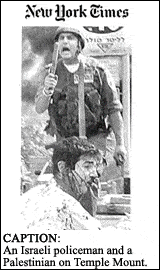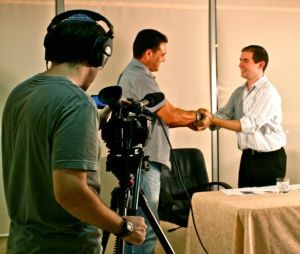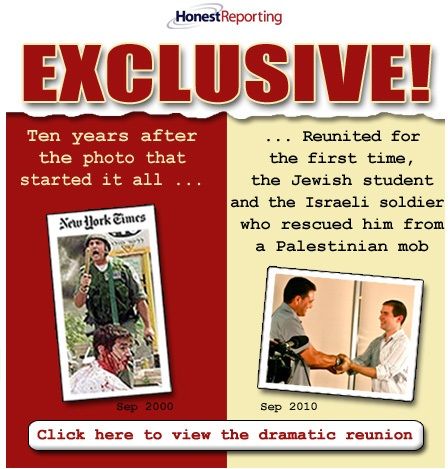Exclusive: Tuvia Grossman Interviewed by HonestReporting
On September 30, 2000, The New York Times, Associated Press and other major media outlets published a photo of a young man — bloodied and battered — crouching beneath a club-wielding Israeli policeman. The caption identified him as a Palestinian victim of Israeli brutality — with the clear implication that the Israeli soldier was the one who beat him.
That young man was, in fact, Tuvia Grossman, a Jewish student from Chicago, who was beaten within inches of his life before being rescued by the Israeli border policeman in the photo.
 The resulting outrage generated by the gross distortion of the photo “launched” HonestReporting. Click to see the original communique.
The resulting outrage generated by the gross distortion of the photo “launched” HonestReporting. Click to see the original communique.
Now, ten years later, we caught up with Tuvia in an exclusive interview.
HonestReporting: How have things changed for you since your picture appeared in the NY Times?
Tuvia Grossman: Ten years ago, I was a single American 20-year old, in Israel temporarily as a student. Today, I am nearly 30, married, have a beautiful nearly three-year-old daughter, a practicing attorney at a corporate law firm in Tel Aviv and a proud citizen of Israel.
While the memories of 10 years ago haven’t faded, it’s often difficult to picture myself in the state I was in. I remember feeling mixed emotions of anger, fear and hopelessness. The misrepresentation of my story in the global news exacerbated my feelings.
However, I am proud to say I have overcome many of those feelings, and, in a way, won the battle the terrorists started. By settling in Israel, raising a family, advancing my career and becoming the person they tried to destroy, I beat the terrorists simply by being alive.
HR: What was your reaction when you heard about the NY Times caption?
TG: The truth is I was not very surprised at all. This was not my first encounter with media bias. I had always been an avid reader, even before my attack, and had come across many instances of blatant bias against Israel.
When hearing about the picture, my initial thoughts went to the soldier. It’s much worse to be accused of beating the person you actually helped protect, than to be accused of being a Palestinian when you are in fact a Jew.
 HR: Did you try to find the soldier in the picture?
HR: Did you try to find the soldier in the picture?
TG: No. First, there were five or six soldiers stationed at the gas station I ran to as I was being pursued by the Arabs. One particular soldier happened to be standing behind me when the picture was taken; however, I owe my gratitude to all the soldiers equally, to the one in the picture, as well as to the less famous ones not photographed — such as the soldier who ripped off his uniform and tied it around my head to stop the bleeding.
I have also been reluctant to find the soldier from the picture precisely because of the misrepresentation. What do you say to someone who helped save your life, but was portrayed across the globe as a vicious animal?
HR: Your ordeal has inspired groups like HR to fight media bias against Israel. Has coverage of Israel improved in the past ten years?
TG: Media bias against Israel is as strong as ever.
However, public awareness to such bias has increased exponentially, which is the first and most crucial step to stop the actual bias. Organizations like HonestReporting may not be able to force media outlets across the globe to reflect the unbiased truth, but they have been very successful in raising awareness.
HR: Your image is closely associated with second intifada, but you stayed out of the public eye. Why the low profile?
TG: This has to do partly with my personality and partly with my ongoing efforts to recover. I have always been a “low-profile” person, and usually try to avoid the limelight.
Soon after the story broke, I received numerous calls from major network news shows in the US inviting to fly me to their studios for interviews. I turned all of them down. What I did agree to attend were pro-Israel rallies, events in whose causes I strongly believed in, where I felt my presence could inspire others to support Israel.
In addition, being in the limelight would have forced me to constantly recall and relive the trauma. Even ten years later, recalling the story, discussing it, or even seeing objects which may remind me of it, can be painful. Avoiding recollections of the trauma is one of my methods of coping with it.
Now and then, when I truly believe in a cause, such as HR, I’m willing to discuss what happened, because I feel my experiences can have a positive impact on others.
HR: Have you discussed the attack with your daughter, or plan to do so when she’s older?
TG: My daughter is not yet three; she’s too young to understand the attack and how it has influenced me, so I have told her nothing of it. I do think it is important for her to hear about it from me rather than from other sources, like the Internet. When the time is right, I’ll discuss it with her in great detail.
Every year I make a seudat hoda’yah, or thanksgiving meal, right before Rosh Hashana to thank G-d for allowing me to survive the incident. This year, at the seudah, I may explain to her that a long time before she was born, Abba was hurt badly and I make a special meal to thank G-d that all is better now. I won’t elaborate more than that to her at this stage.
HR: What’s the importance of HR’s work to you?
TG: HR’s work is important to me on a number of levels.
Most obvious is the need to fight the media bias against Israel. As I mentioned, the best way is by informing the public, on a mass-scale, of the blatant misrepresentations, which in turn will cause the public to distrust the biased media until they start reporting truthfully.
On a deeper level, HR’s work goes further than just exposing anti-Israel media bias to the public. HR exposes the positive sides of Israel in a way no one else can.
After my attack, when I heard of the misrepresentation in the NY Times, what bothered me more than the false reporting was that the truth had become less of a focal point. The public was caught up in what was not true; the truth was no longer important. HR doesn’t only expose the lies, they also substantiate the truth, and this what makes their work so important.

A Decade On: Help HonestReporting’s Work
Ten years later, the media bias against Israel shows no sign of abating. Please help HonestReporting’s work by promoting the video above by forwarding to friends and family, sharing on social media, and following us on Facebook and Twitter.
And if you haven’t already done so, sign up now to receive information from HonestReporting and become part of our army of activists working to ensure fairness for Israel and accuracy in the news media.


